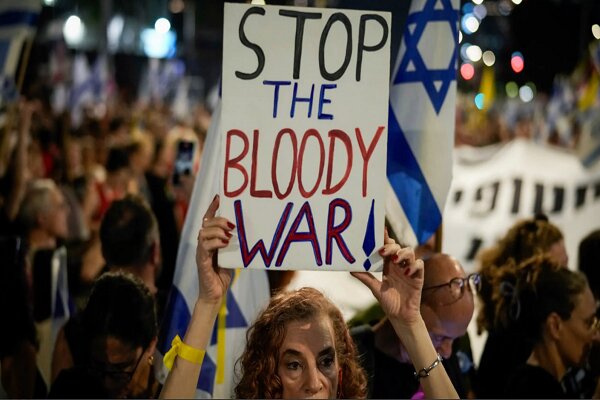Tehran-Recent petitions from hundreds of prominent Israeli literary figures calling for an end to the Gaza War represent a rare public display of dissent by Israeli cultural elites and the gap between Israeli society on current conflicts and its human costs.
This, coupled with parallel movements by opposition military reserves, academics and the international literary community, is part of a rich, complex, and often difficult challenge to the Israeli regime’s war policy, raising widespread questions about wartime culture, politics and ethics.
Cultural elites break the ranks
Signers, authors, poets, publishers, illustrators, literary editors and scholars are dull. They say Netanyahu made a careful, gradual deal to end the war, fearing that peace would be the death of his political career and personal freedom as legal accusations continue to pile up.
The accusation targets the very center of Israel’s political crisis, accusations that the Prime Minister is ready to extend the war of disaster so that he does not go to prison, and raises fundamental questions about the combination of politics, justice and war.
Among the prestigious list of signatories are Israeli Prize winner Nissa Bendoff, playwright Yehoshua Sobol, Sapeel Prize winner Offer Oren and journalist Daniela London Dekel, bringing enormous cultural weight to the petition. Their appeals are directed towards Netanyahu and the Minister of Defense, government officials, members of Knesset, and senior IDF officers, and represent a broad call for accountability and policy reform.
Wide social and military dissatisfaction
The writer’s appeal was one of many diverse forms of dissatisfaction, along with letters and declarations signed by thousands of military reserves, doctors and scholars seeking an end to the war. These groups warn that extensions of combat puts the lives of hostages and soldiers at risk, but politicians are using conflict to strengthen their strength rather than establishing true security.
The participation of the military in such appeals is particularly impressive. Because such steps undermine the government’s position by those who are supposed to carry out the order. Internal resistance reflects a broader public debate on the costs and prices of conflicts. The breakdown of the January 2025 ceasefire and the continued bombing of Israel in Gaza have produced unprecedented levels of killing and destruction, causing rage and despair among the Israelites.
Many of them wonder if government policies are just wise. The appeals from the military and academic circles give more weight to the demands of cultural elites, meaning resistance is not limited to the elements of social ties, but spreads throughout Israeli society.
The timing is strategic. Global criticism of Israel is consistent with and increases its impact as it is protected by the UN account of Gaza’s humanitarian crisis. That hostage angle appeals to global human interest, making it difficult for critics to portray it as a naive pacifist.
International Literature Boycott and Cultural War
In addition to these domestic voices in Israel, there is also a global massive collective cultural boycott of work in the global literary community based on the fact that these works have until recently been part and plot of Israel and are now known to participate in occupation and attacks on the Palestinians.
Over 1,000 writers and literary workers around the world have signed up to boycott Israeli publishers, literary festivals and cultural events that do not respect the rights of Palestinians. They call it the biggest cultural boycott of Israel’s history and officially accused it of resembling South Africa’s global anti-apartheid boycott.
The boycott campaign is a cultural war, aimed at banishing Israel internationally and pressureing its institutions to change policies believed to promote injustice and violence. This is a sign of the growth of cultural and intellectual protests around the world as literature and art continue to shape public awareness and politics through their work.
The petition by hundreds of literary figures in Israel is a key moment in the ongoing debate about the future of the Israeli-Palestinian conflict. This is to provide a direct challenge to the narrative that governs military operations and seek a reassessment of Gaza’s Israeli strategy.
Furthermore, it shows a trend that can be observed in Israeli society. More and more people are questioning the moral, ethical and political costs of conflict. While petitions may not lead to an immediate halt of war, they serve as reminders of the many things that academics and cultural figures should offer in response to issues of violence and militarism. In the long run, it may form a foundation for more sustainable and just peace.

